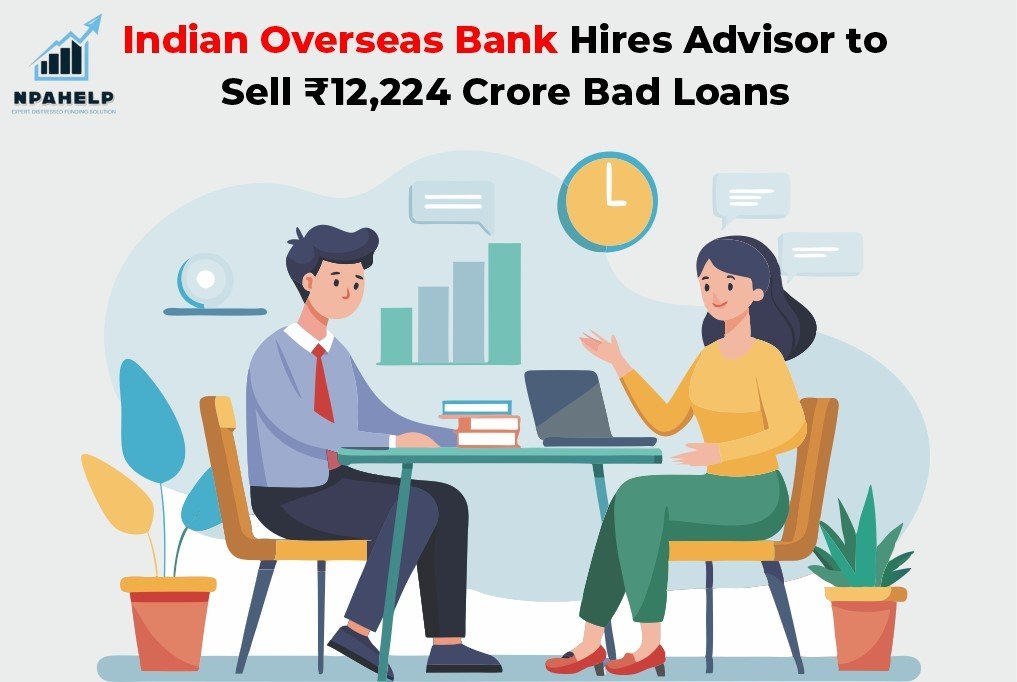
Indian Overseas Bank Hires Advisor to Sell ₹12,224 Crore Bad Loans
Why Is IOB Selling Bad Loans Now?
Indian Overseas Bank (IOB) is making some aggressive measures to lessen its bad loans, or non-performing assets (NPAs). The bank has engaged Special Situation Advisors India, a Mumbai-based company, to assist in the sale of ₹12,224 crore worth of such bad loans. This will assist IOB to consolidate its financial position and boost investor and customer confidence.
Progress Against Bad Loans
Over the years, IOB has improved significantly. Its gross NPA ratio was more than 11% a few years ago. With consistent efforts, it decreased to only 2.72% in September 2024. The net NPAs have now reduced to 0.47%. But the bank still has a legacy of large bad loans that are dragging down performance. This is why it is so significant to sell these legacy accounts.
Who Is the Advisor and What Is Their Job?
It is the first time that IOB has engaged an external advisor in such a huge sale. Special Situation Advisors India has been given the mandate to sell 67 large corporate NPA accounts. These are some of the famous distressed firms such as Videocon Industries, Rotomac Global, Lanco Infratech, Frost International and ABG Shipyard.
How Was the Advisor Chosen?
Several top consulting firms competed for this job, including Deloitte, EY and BoB Capital Markets. Special Situation Advisors India won by quoting a very low fee—just 11 paise for every ₹1 crore recovered. This shows how competitive the market is for handling bad loans in India.
What Is the Plan for Selling NPAs?
The advisor will contact a large number of prospective buyers, such as asset reconstruction companies (ARCs), debt aggregator funds and special situation investors. A large number of these bad loan accounts are already in court battles or in bankruptcy, which may complicate the sale. The target is to sell it in four months.
Impact on IOB’s Finances
This sale comes at a good time for IOB. The bank recently reported its highest ever quarterly profit—over ₹1,000 crore for January-March 2025. Selling off these big bad loans will further improve its profits, reduce its financial risks and boost its credibility in the market. It will also free up money for the bank to lend to new and better customers.
Challenges to Watch For
A lot depends on how much money IOB can recover. Some of these accounts may attract good offers from buyers, but others might not fetch high prices because of ongoing litigation or the poor financial health of the borrowers. Still, this sale could set an example for other government banks looking to clean up their books.
Conclusion
This audacious step is helping IOB to adopt new practices and consult experts to solve old issues. Assuming that all goes to plan, this may assist in establishing new norms of how the banks of India handle their bad loans and assist the whole sector to become stronger.
Frequently asked Questions (FAQs )
-
1. What prompted IOB to sell its bad loans now?
IOB has made big progress in reducing its NPAs over the years but still has some legacy bad loans. Selling these now helps the bank clean up its books and focus on growth. It’s also a timely move as the bank is performing well and wants to keep up the momentum.
-
2. Who’s managing this sale of bad loans?
For the first time, IOB has brought in an external advisor — Special Situation Advisors India. They’ve been hired to handle the sale of 67 large corporate NPA accounts, some involving well-known companies like Videocon and Rotomac.
-
3. How was this advisor chosen?
It was a competitive process. Several top firms like Deloitte and EY were in the running but Special Situation Advisors India won the mandate by offering the lowest fee — just 11 paise for every ₹1 crore recovered.
-
4. What impact will this have on IOB’s finances?
If the sale goes as planned it could be a big positive. IOB recently posted its highest-ever quarterly profit and offloading bad loans will reduce risk, improve capital availability and build investor confidence.